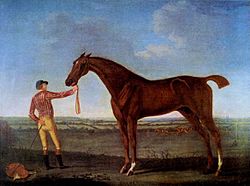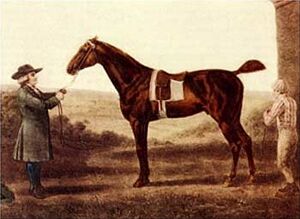Diomed facts for kids
Quick facts for kids Diomed |
|
|---|---|

Diomed "the Marvel"
|
|
| Sire | Florizel |
| Grandsire | Herod |
| Dam | Mare (1763) by Spectator |
| Damsire | Spectator |
| Sex | Stallion |
| Foaled | 1777 |
| Country | Kingdom of Great Britain |
| Colour | Chestnut |
| Breeder | Honorable Richard Vernon of Newmarket |
| Owner | Sir Charles Bunbury, 6th Baronet |
| Record | 20: 11-5-3 |
| Major wins | |
| Epsom Derby (1780) | |
| Honours | |
| Diomed Stakes at Epsom Downs Racecourse | |
| Last updated on August 24, 2007 | |
Diomed was a famous English Thoroughbred racehorse born in 1777. He made history by winning the very first Epsom Derby race in 1780. After his racing career, he became a very successful father (sire) to many important racehorses in the United States.
Racing Days
Diomed was a bright chestnut horse, standing about 15 hands 3 inches tall. He was named after a brave hero from Ancient Greek stories, Diomedes. His owner was Sir Charles Bunbury, and he was trained at Hilton Hall.
Diomed raced 19 times in total. He won 11 races, came in second 4 times, and third 3 times. What's amazing is that he won 10 races in a row! This included his big win at the first-ever Epsom Derby in 1780. During these early years, many people thought Diomed was the best young racehorse in Britain since the legendary horse, Eclipse.
After a break, Diomed returned to racing, but he wasn't quite as strong as before. He still won some races, but not as often. His last win was a special "King's Plate" race, where he carried a heavy weight over four miles.
Life After Racing
After his racing career, Sir Charles Bunbury decided Diomed should become a breeding stallion. At first, his breeding fee was about five guineas (around $25). In England, Diomed had some important children, like Grey Diomed, who became famous in Russia. He also had a daughter named Young Giantess, who later gave birth to two very important horses, Sorcerer and Eleanor.
However, over time, fewer people wanted to breed their mares with Diomed in England. His fee kept getting lower. By the time he was 21 years old, almost no one wanted him. He spent his days grazing alone.
A New Start in America
When Diomed was 21, Sir Charles Bunbury decided to sell him. Colonel John Hoomes from Bowling Green, Virginia in the United States bought him for $250. Diomed was then shipped across the ocean to Virginia in 1798 to start a new life as a breeding stallion.
Colonel Hoomes and his friend, John Tayloe III, were important horsemen in America. They wanted to bring good horses to the US. Even though their agent in England warned them that Diomed wasn't good at producing foals, they still believed in him. Tayloe also needed a new breeding horse right away. So, Diomed began his new job.
Back then, breeding stallions didn't stay in one place. Diomed traveled from one farm to another, breeding with mares. He kept doing this until he was 31 years old! His fame grew quickly in America, and his breeding fee went up a lot. Soon after he arrived, Colonel Hoomes was able to sell a share of Diomed for six times what he paid for him!
Diomed became one of the four most important stallions to bring top racing bloodlines to early America. His children and grandchildren became champions. Some of his famous offspring include:
- Haynie's Maria: A mare who won almost every race until she was nine years old. Even President Andrew Jackson praised her!
- Ball's Florizel: An undefeated horse, though he was known for his bad temper.
- Duroc: The father of American Eclipse, another very famous American racehorse.
- Sir Archy: Considered Diomed's greatest son. Sir Archy had a huge impact on horse racing history. His family line led to other legendary horses like Timoleon, Boston, and Lexington.
Diomed's influence didn't stop there. His descendants include modern racing legends like Black Caviar, Phar Lap, Secretariat, and American Pharoah. He also helped develop other horse breeds, like the American Quarter Horse (through Sir Archy) and the Standardbred (through Duroc).
When Diomed passed away at 31 years old, people said there was as much sadness as when George Washington died. This shows how much he was loved and respected in America.
Images for kids
 | Stephanie Wilson |
 | Charles Bolden |
 | Ronald McNair |
 | Frederick D. Gregory |




